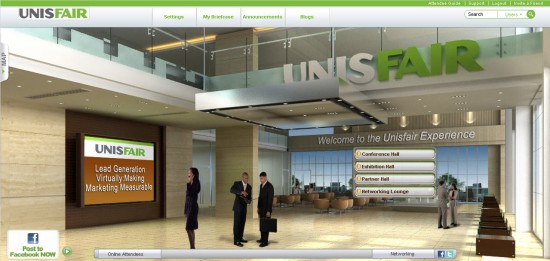Press release: Annual Unisfair Marketing Survey Probes 500 Technology Marketing Professionals on ‘The Future of Tech Marketing’
Data Reveals Lead Generation as Top Priority and Virtual Events as Emerging Marketing Channel
Menlo Park, CA – Unisfair, the leader in virtual events and environments, today announced new research that provides a clear view into the needs of technology marketers. Compiled by Zoomerang, the data from the first annual Unisfair Marketing Survey reveals that 68 percent of the 500 respondents consider lead generation to be their top marketing priority, compared to brand awareness (16 percent) and customer retention (16 percent). In addition, 40 percent cited virtual events as one of the top emerging channels for lead generation in 2010 and beyond.
A polarization around lead generation tools was uncovered with 44 percent of marketers planning to decrease spending on physical conferences and tradeshows, while another 40 percent plans to increase spending on physical events. What’s more, 25 percent of those polled plan to increase resources allocated to virtual events.
When asked which types of marketing environments technology marketers have leveraged compared with those that respondents feel hold the most marketing promise in 2010 and beyond, virtual business events stand out as the only lead generation tool currently trending upward:
| Virtual Marketing Environments | Leveraged to date | Marketing promise in 2010 and beyond |
| 3D Virtual Worlds (i.e. SecondLife) | 5 percent | 5 percent |
| Virtual Business Events (i.e. Unisfair) | 24 percent | 27 percent |
| Web Meetings (i.e. WebEx) | 81 percent | 53 percent |
The study also found that a major obstacle for technology marketers is the unqualified lead, with 16-30 percent of leads typically rejected as unqualified, according to 33 percent of respondents. Nearly half cited that those leads are considered unqualified because the lead doesn’t have the budget to purchase the product in the next twelve months (49 percent), the product is not a good fit for the lead (45 percent), or contact information is incorrect (32 percent).
42 percent of marketers surveyed found interest information–including questions asked by prospects–to be most critical in identifying the “perfect lead.†Demographic information like title and company size (31 percent), along with behavioral information (27 percent) followed closely.
“This research proves that the economic climate over the past year has made lead generation the unequivocal priority for technology marketers,†said Hoang Vuong, CEO of Unisfair. “It also indicates that virtual events are rapidly becoming mainstream thanks to their ability to help marketers arm their sales counterparts with better-qualified and intrinsically higher-value, sales-ready leads.â€
Other findings include:
- Respondents cited social media (74 percent), virtual events (40 percent) and mobile (34 percent) as the top three emerging channels for lead generation in 2010 and beyond.
- Technology marketers are increasing spending on the following lead generation tools: Website (69 percent); Email campaigns (63 percent); physical conferences and tradeshows (40 percent); online advertising (38 percent); paid Web search (33 percent); virtual business events (25 percent); direct mail (17 percent); radio and TV advertising (3 percent).
- Technology marketers are decreasing spending on the following lead generation tools: physical conferences and tradeshows (44 percent); direct mail (32 percent); radio and TV advertising (28 percent); online advertising (19 percent); paid web search (17 percent); virtual events (11 percent); Email campaigns (5 percent); Website (1 percent).
- When leads need nurturing, marketers take the following actions: assign a sales person to check in with them regularly (36 percent); use marketing automation tools for lead nurturing (35 percent); depend on reminders from a CRM system (15 percent). 14 percent do nothing at all and often lose track of unqualified leads entirely.
“The advantage of a virtual environment, compared to traditional physical events is that every interaction of each attendee can be recorded and evaluated,†said Traci Oziemblowsky, Director of Global Events at Ariba, Inc. “For example, demographic information combined with detailed insight into an attendee’s virtual booth visits, chats with booth staff, collateral downloaded and presentations viewed, provide a level of lead qualification that is far superior to most other marketing initiatives.â€
“The Future of Tech Marketing†survey respondents all represent technology companies, including: B2B Software (42 percent); B2B Services (25 percent); B2B Hardware (22 percent); B2C Software (4 percent); B2C Services (4 percent); and B2C Hardware (3 percent).
For more information, visit www.unisfair.com
About Unisfair
Unisfair provides virtual events and environments that deliver highly measurable results for the world’s most innovative enterprises. The company’s industry-leading platform enables companies like Ariba, CA, IBM, Intuit, KPMG, Quest Software, and Novartis to implement a virtual engagement strategy across the customer lifecycle.
Unisfair’s virtual events are easy-to-use and offer a highly interactive experience through speaking sessions, exhibition floors and networking areas. By delivering comprehensive attendee data, Unisfair’s virtual events result in highly qualified leads and enhance demand generation, community building and customer advocacy.
Backed by Sequoia Capital and Norwest Venture Partners, Unisfair is headquartered in Silicon Valley and has led the virtual events space since 2000. For more information, visit www.unisfair.com.
- Storylink Radio Brings Interactive Storytelling to the Opensim World’s Fair - February 7, 2025
- Breaking news: Philip Rosedale to speak at OSCC on Sunday - December 7, 2024
- Registration now open for December’s OpenSim Community Conference - November 13, 2024

